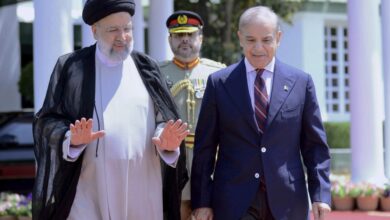Ramaphosa Warns: Arresting Vladimir Putin in South Africa Would Be a ‘Declaration of War’

Ramaphosa Warns: Arresting Vladimir Putin in South Africa Would Be a ‘Declaration of War’
South African President Cyril Ramaphosa’s warning comes as a significant development with potential diplomatic repercussions. The international meeting in Johannesburg, to which Russian President Vladimir Putin is invited, now faces increased scrutiny and complexities. The presence of an active ICC arrest warrant against Putin raises concerns about how South Africa, as the host country, will navigate the situation and balance its legal obligations with its diplomatic relations with Russia.
Any decision related to the arrest warrant could have far-reaching consequences and may require careful diplomatic negotiations to avoid escalating tensions between Russia and South Africa or affecting international relations.

The accusations against Vladimir Putin for alleged war crimes during the Ukraine conflict have been a contentious issue. Russia, being a non-member of the International Criminal Court (ICC), has consistently rejected the validity of the arrest warrant, considering it legally void. On the other hand, South Africa, as an ICC signatory, is obligated to cooperate with the court in matters related to arrest warrants.
The situation places South Africa in a delicate position, as it faces the challenge of upholding its commitments to the ICC while considering its diplomatic relations with Russia. The potential arrest of a sitting head of state could trigger significant diplomatic tensions and has the potential to strain international relations. The decision on how to handle the situation during the international meeting in Johannesburg will require careful deliberation by South African authorities to strike a balance between their legal obligations and the need to maintain diplomatic relations with Russia.
This case poses complex legal and diplomatic implications and may serve as a test for how countries navigate their responsibilities as ICC signatories while managing sensitive diplomatic situations involving high-ranking officials of non-member states.

South Africa’s past refusal to arrest Sudan’s then-President Omar al-Bashir, who was also subject to an ICC arrest warrant, has raised concerns about its commitment to honor such obligations in the future. The decision to allow al-Bashir safe passage in 2015 drew criticism from the international community and brought attention to the complexities involved in balancing legal obligations with diplomatic considerations.
With the upcoming BRICS summit in August, South Africa faces another critical situation as it extends an invitation to Vladimir Putin, who is subject to an ICC arrest warrant. Hosting the Russian president could potentially reignite discussions about South Africa’s adherence to its ICC commitments and its approach to handling high-profile individuals with outstanding warrants.
The BRICS summit serves as a platform for cooperation among emerging economies and is considered an alternative to the G7 group of advanced economies. However, hosting a head of state who is wanted by the ICC may draw attention to the legal and diplomatic challenges faced by South Africa in navigating its role within the international community. The upcoming summit could become a significant moment for South Africa to demonstrate how it balances its legal obligations and diplomatic engagements on the global stage.

The situation regarding the potential arrest of Vladimir Putin in South Africa has become contentious, with the country’s biggest opposition party, the Democratic Alliance, taking the matter to court to push for the authorities to carry out the arrest should the Russian president visit. However, President Cyril Ramaphosa has expressed strong opposition to such a move, citing concerns over national security.
According to court documents, Ramaphosa has emphasized the complexities of executing a request to arrest and surrender President Putin. He pointed out that Russia has made it explicitly clear that arresting its sitting president would be seen as a declaration of war. Given the potential risks associated with such an action, Ramaphosa argued that it would be inconsistent with South Africa’s constitution to engage in a conflict with Russia.
President Ramaphosa highlighted that South Africa, along with several other African nations, is actively engaged in talks with Russia and Ukraine to find a peaceful resolution and end the ongoing conflict. Attempting to arrest Mr. Putin during his visit to South Africa could potentially jeopardize these delicate diplomatic efforts and hinder progress toward peace.
Last month, African presidents embarked on a peace mission to European nations, aiming to facilitate a dialogue between Ukraine and Russia. However, the mission ultimately did not succeed in bringing the two countries to the negotiating table.

The reasons behind African nations’ varied stances on the conflict in Ukraine and their reluctance to back UN General Assembly resolutions condemning Russia’s actions can be multifaceted and complex.
Historical ties play a significant role, such as South Africa’s anti-apartheid connections to the Soviet Union during the Cold War era. These historical alliances can influence the present-day relations between African nations and Russia.
In some cases, present-day interests and security considerations come into play. For example, Mali’s reliance on Russian Wagner mercenaries to combat jihadists indicates a pragmatic approach to addressing security challenges.
Economic ties also factor into the equation. Several African nations have economic interests and business relations with Russia, fostering partnerships in areas such as trade, investment, and energy.
The influence of individuals, such as sanctioned Russian oligarch Viktor Vekselberg’s reported contributions to South Africa’s ruling party, the African National Congress (ANC), may further complicate the dynamics. Such financial connections can impact the political landscape and potentially influence policy decisions.

Overall, Africa’s engagement with Russia reflects a mix of historical, strategic, and economic factors that shape the relationships between the two regions. As global geopolitical dynamics continue to evolve, African nations will navigate a complex web of interests, both domestic and international, in their approaches to issues like the conflict in Ukraine and broader international relations with Russia.






